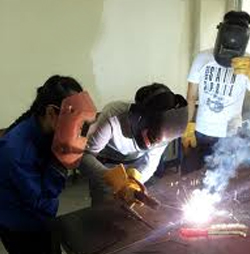Fabrication and welding engineering courses are available for people interested in pursuing a professional career in metalwork. Most states have a high demand for welding fabrication engineers, since the position entails specialized skill sets and training. The information below can help you decide if this field is the career path you want to take.
Once you finish the engineering course, you should be able to identify metals and their properties, know proper care of equipment, follow safety procedures, interpret drawings, perform welding processes, handle welding equipment, and use basic geometry and other math skills.
Accuracy is an important skill engineers would develop in time. Fabrication and welding engineers must have a good eye for detail and make good judgments throughout his/her career.
Fabrication and welding engineers who gain experience on the field may be promoted to managerial positions. They may also land jobs as trainers, instructors, inspectors, or plant supervisors.
Back to Top
Fabrication and Welding Engineering Curriculum
Different schools have their own curriculum, but they generally include the following topics:- Work safety – One of the first things taught in a fabrication and welding engineering course is work safety. The topics deal with laws, electrical and fire hazards, fire prevention, first aid, accidents in the workplace, and safe handling of equipment, among others.
- Fabrication and Welding Materials – You will then learn all about the classification and properties of materials, ferrous metals, symbols and abbreviations of metals, non-ferrous alloys and metals, natural and synthetic non-metals.
- Heat treatments – Introduction to heat treatment processes, safety requirements involved in heat treatment processes, heat-treatment furnaces, treating of carbon steels and non-ferrous alloys, atmosphere control and temperature measurement.
- Documents – Aside from hands-on knowledge, a fabrication and welding engineering course also includes reading and developing documents. You’ll learn how to interpret graphs, tables, charts, blueprints and other information. Other subjects may include dimensioning, welding symbols and engineering drawing.
- Measuring and marking out equipment –Here you’ll learn about angular and linear measurement, proper use of measuring equipment, marking out techniques and equipment, as well as how to use and create templates.
- Cutting tools – You’ll understand principles of cutting tools, and learn how to handle drills, drilling machines, portable power tools, and shearing, blanking, piercing, stamping and routing equipment.
- Sheet and plate metalwork, joining processes, structural steelwork and pipework – Here you’ll learn about roll-bending, flow-forming and swaging sheet metal, basics and fabrication of metal spinning,joining processes (that includes mechanical connections, brazing, soldering, fusion welding, etc.), pipe bending and fitting, structural steel connections, web stiffeners, and many more.
Skills You’ll Develop
Obtaining a degree in fabrication and welding engineering is important not only to learn the principles and methods used in welding, but also developing skills needed in performing the job efficiently.Once you finish the engineering course, you should be able to identify metals and their properties, know proper care of equipment, follow safety procedures, interpret drawings, perform welding processes, handle welding equipment, and use basic geometry and other math skills.
Accuracy is an important skill engineers would develop in time. Fabrication and welding engineers must have a good eye for detail and make good judgments throughout his/her career.
Employment Opportunities
There is always a shortage of skilled fabrication and welding engineers in the United States, considering since jobs are not confined to one industry. Engineers can work in building bridges, manufacturing engine vehicles or aircraft, setting up cross-country pipelines, fabricating equipment with a focus on one or more metals, and many more.Fabrication and welding engineers who gain experience on the field may be promoted to managerial positions. They may also land jobs as trainers, instructors, inspectors, or plant supervisors.
Back to Top
Fabrication and Welding

Fabrication and Welding Resources
- Home
- Custom Fabrication and Welding
- Fabrication and Welding Apprenticeships
- Fabrication and Welding Books
- Fabrication and Welding Companies
- Fabrication and Welding Courses
- Fabrication and Welding Engineering
- Fabrication and Welding Jobs
- Fabrication and Welding Schools
- Metal Fabrication and Welding
- Plastic Fabrication and Welding
- Precision Fabrication and Welding
- Stainless Steel Fabrication and Welding
- What is Welding and Fabrication
Sponsored Links
